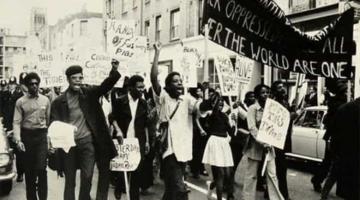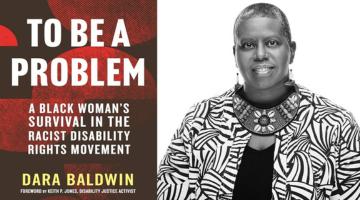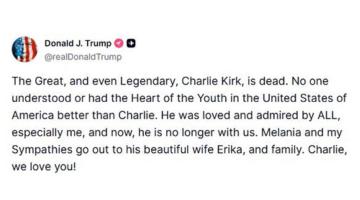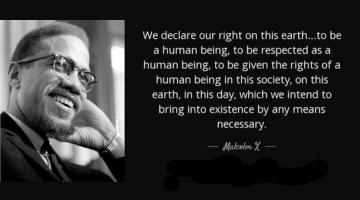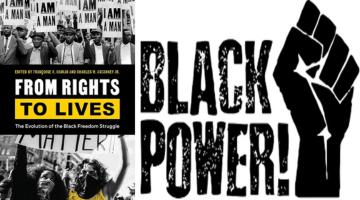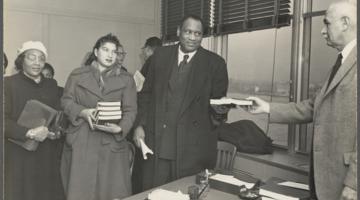Joy James speaking on a 2019 panel at the Center for Brown University's Study of Slavery and Justice's Carceral State Reading (www.youtube.com/watch?v=z9rvRsWKDx0)
In this series, we ask acclaimed authors to answer five questions about their book. This week’s featured author is Joy James. Dr. James is Ebenezer Fitch Professor of Humanities at Williams College. Her book is New Bones Abolition: Captive Maternal Agency and the (After)life of Erica Garner. Proceeds from New Bones Abolition: Captive Maternal Agency and the (After)Life of Erica Garner go to Prison Radio.
Roberto Sirvent: For readers of BAR who are not familiar with the life, political analysis, and legacy of Erica Garner, can you please share how she inspired this new book project?
Joy James: Before and after Erica Garner died in December 2017 in a Brooklyn hospital, four months after birthing her second child who she named after her slain father Eric Garner, I met and worked with impacted mothers who had lost their children, siblings, or relatives to predatory police forces in North and South America. Chicago mothers Shapearl Wells and Dorothy Holmes taught me a lot through their battles in Chicago against police killings of their sons. They also traveled out of the US to share and consult with other impacted families and mothers. Across generations and familial roles, the battle to maintain public memory of state violence and the necessity of struggles for justice alter lives. However, victimization is not inherently a sign of radical analyses and agency. Part I of New Bones Abolition: Captive Maternal Agency and the (After)Life of Erica Garner (NBA) describes conflicts and alliances inside and outside of the US. I met diverse, traumatized people who created resistance strategies against police and vigilante violence. Family members, often mothers, were impacted by police violence and executions and as a result became political-social activists and educators. New Bones Abolition focuses on the rise of abolition and Black Lives Matter (BLM) after the 2014 police killings of Eric Garner, eighteen-year-old Michael Brown, and twelve-year-old Tamir Rice. Political responses from various sectors of leadership and mass movements included those of one key risk-taking responder — Erica Garner.
New Bones Abolition identifies Erica Garner as a “Captive Maternal.” Captive Maternals are caretakers who resent and resist the theft or repurposing of their generative powers to stabilize an imperial state and police forces that police a democracy that fails to protect civil/human rights. Captive Maternal stages include: (1) caretaker; (2) protester; (3) movement maker; (4) maroon; (5) war resister. Inevitably, these early stages become cycles shaped by subjugation by the state and corporation and wealthy funders. The most advanced stages against repression and cooptation are aligned with the contributions made and the risks taken over several generations. For example, Erica Garner and Assata Shakur were both militants but in different ways. Garner began as a caretaker and developed into a radical thinker and organizer. Shakur began as a radical Black activist and transitioned into a revolutionary. In NBA, I differentiate between the epicenter or surface of struggle (using bell hooks as an example) to the hypocenter (“ground zero”) of the revolutionary underground (citing Assata Shakur as an example). Readers should scrutinize the contributions of diverse Black women who embrace conventional politics, liberalisms, radicalism, and revolutionary politics. Most of the academic prizes and celebrity status accrue to academics who can align with conservative or liberal thought. How do we step beyond these political zones in order to better address personal trauma, grievances and state violence so that we can increasingly confront predatory structures?
You refer to Erica Garner and Assata Shakur as “war resisters.” What does it mean to see them as war resisters and why is it so important for revolutionary struggles to adopt this language of “war”?
War resisters are the most advanced stage for Captive Maternals who have tried conventional caretaking, protests, movements. War resisters who respond to the neglect and lethal violence that the state and its allies inflict upon radicals: from firing you from your job; mandating substandard health care; gaslighting or “bad jacketing” with slander and isolation. Even in the midst of labor hustles—not to be confused with brand or propaganda hustling—caretakers understand that their battles are not only about an individual persona; battles of integrity are liberation are fought to secure and provide resources to not just one individual but to communities and countries through internationalism. Black feminisms that align with state feminisms promote compradors; their “care” will not subvert the predatory powers of the state, corporate funder, repressive academia. In the concentric circles of care, the dialectical spiral of struggle moves from caretaker, to protester, into movement maker, maroon, and war resister who faces material struggles with few delusions or fantasies. The majority of Americans (including US Blacks/Africans) are not radical (nor are the majority of trauma victims). The majority of Black feminists are encouraged to become state feminists in order to obtain resources and elite positions. Captive Maternals move closer to building autonomous communities and resistance to colonization and predatory war resistance, i.e., into the zones of direct confrontation with predatory police and state. Most feminist, conventional abolitionists seek to reject, obscure or attack the militant Captive Maternal. In my earlier work, Shadowboxing, I distinguish “managerial” Black feminisms from radicalizing Black feminisms. New Bones Abolition discusses the contributions and contradictions of varied Black feminists including bell hooks, Assata Shakur, Angela Davis; in Part II, it focuses on Erica Garner’s agency, contributions, and vulnerabilities.
Varied formations of Black Liberation Movements exist and are reflected in the contributions of the women led above. Few are militant. Most appear to be funded by influential nonprofits that lack unionized workers. Several generations before BLM, radical formations were more clearly defined to some degree. The representations of past radicalism have merged and blurred representations of Black liberatory radicalism today. For example, Assata Shakur joined the Black Panther Party (BPP) in Harlem. Through the lethal FBI COINTELPRO operatives, she was forced into the underground Black Liberation Army (BLA) by state repression to counter liberation movements. An analysis of the iconographies of Shakur and Davis is offered by Shakur’s comrade Dhoruba Bin Wahad in BPM/RSTV interviews (NBA references his critiques).
In an earlier article you wrote about Erica Garner, you describe her as one of many ancestors who “are so spirited that their fierce, radical critiques disrupt liberal and progressive politics and diverge from popularized forms of protest, e.g. the sectors of Black Lives Matter (BLM) aligned with the Democratic Party.” In what ways can our memory of Erica Garner prevent activists from becoming de-radicalized by elite academic, political, and economic institutions?
Memories are likely insufficient to prevent activists from succumbing to state and social propaganda that encourages us to trust bureaucracies and educators securitized into and sedated by liberal progressivism. We have to remember our ancestors to better perceive ourselves and our possible trajectories towards freedom from carceral settings. Erica Garner, as a young mother, died at the age of twenty-seven due to poor health, exhaustion, stress and grief following the NYPD public killing of her father on a Staten Island street. This book remembers and honors her but also weaves her contributions into the narratives about others who have contributed to war resistance. I am one of many people who were not fully aware of her needs for assistance and her contributions to resist predatory policing.
We struggle not only to avoid being de-radicalized. We struggle to create, expand and maintain conduits of care so that even strangers can be mindful of those on the “frontlines” who refuse to become celebrities or work with the state or Democratic National Committee (DNC). Those incarcerated and the “free world” require and deserve the care we all desperately need. Erica Garner’s caretaking and activism mark her, in my mind, as a Captive Maternal who navigated multiple stages of engagement: family care, protest, movement building, organizing maroon collectives, training in cadres for war resistance. Erica Garner, as thousands have done, helped to build and push for the formation of movements. She honored those slain by predatory policing, from her father to others, such as Freddie Gray who was killed by Baltimore police (who severed his spine in a “rough ride” within a police van).
Disconnecting from Towers of Babel can enhance serious study driven by revolutionary love not digital bashing. The prophetic Black theologian Howard Thurman notes lessons given by his mother: faith and awareness can overcome fear and “transform it into power to strive, to achieve, and not to yield.” NBA attempts to uphold faith and awareness through political theory, education, and advocacy. Those who organize on the ground shape intellectuals who have a wider ken than those who restrict their vision to elite campuses. Everyone has a part to play, but not everyone understands the terrain and what it means to climb or burrow in radical politics without being shielded by (white) elite proximity. Erica Garner’s political maturation from 2014-2017 was brutal. Assata Shakur has endured her political educational journey for decades. Her memoir has left an imprint that we should all read and revisit for analyses, critical interventions, and love (read her poems).
New Bones Abolition is not a biography of Erica Garner. The book has three parts: Part I on feminism and Captive Maternals; Part II on Erica Garner, Eric Garner, and the NYPD, media and government; Part III on We Charge Genocide, political prisoners and liberators. Rather than attempt to paint a full portrait of a complex, fierce Black mother who became an antagonist of predatory and lethal policing from the July 2014 death of her father to her own death in hospital in December 2017, New Bones Abolition addresses caretaking, captivity, compradors, the alignment and conflict between Black feminism and Captive Maternal Agency. It recognizes Garner as one of many leaders. A working-class Black mother shaped by Agape—love as political will—communal care and protections, Erica Garner with cadres battled local, state, and national governments. While rejecting corporate and nonprofit buyouts, she defied the intimidation of the NYPD. Garner should be remembered as a brilliant instructor. Even if one does not agree with her analyses or subversive/abrasive speech, she should be studied and remembered.
For the book The Ethics of Policing, you wrote a chapter titled “Police Ethics through Presidential Politics and Abolitionist Struggle: Angela Y. Davis and Erica Garner.” In it, you argue that Garner modeled a much more militant strategy to activism than Davis, especially when it came to confrontations with political elites and law enforcement. How does your argument in that essay connect to this new book, as well as some of the larger questions you’ve explored elsewhere around the “celebrity activism” of people like Angela Davis?
To better understand the emergence of Professor Davis as a radical icon for Black autonomy and militancy, I suggest reading Contextualizing Angela Davis: The Agency and Identity of an Icon. In NBA’s Chapter 6, “Campaigning for Bernie and against the DNC,” under the subheading “BLACK WOMEN SPLINTER IN THE 2016 PRESIDENTIAL ELECTION,” I compare and contrast Erica Garner, as a young Black militant mother largely not remembered as an effective BLM organizer, with an international icon and influential academic who significantly shaped the trajectory of “abolition.” There are various types of abolition and different definitions of radicalism. In 2016, Erica Garner campaigned for Senator Bernie Sanders (Independent, VT) who challenged Hillary Clinton during the democratic primary. Garner’s support largely focused on Sanders’ domestic policies and public condemnations of predatory policing. Sander’s foreign policy positions, similar to Clinton’s, failed to be informed by Israeli journalist Gideon Levy’s 2015 lecture. Levy’s in-depth analysis of Israeli/US human rights violations of Palestinians asserted that under continued occupation, abuses and deaths would lead to resistance and continued warfare, as well as conservative/reactionary Israelis attacking progressive Jews who advocated for a Palestinian state. Unlike Sanders and Clinton, Angela Davis has been a prominent supporter of BDS (Boycott, Divestment, Sanctions) and targeted in academia for her support for Palestinians. Davis, who had run on the Third Party CPUSA ticket twice in the 1980s, switched to support the DNC when she campaigned for Barack Obama in 2008 and 2012, and later for Clinton in 2016, and Biden/Harris in 2020. All three presidential candidates were aligned with Israeli conservatives/reactionaries, occupation, and authoritarian policing (as well as AFRICOM violence in Africa). Obama’s former Secretary of State, Clinton also proved to be a war hawk who helped to destabilize Libya and for advocated Israel to continue with US funding the occupation of Palestine despite charges of ethnic cleansing and genocide. Black activists had castigated Hillary Clinton labeling Black youths/children as “super predators” and her supporting President Bill Clinton’s 1996 Omnibus Crime Bill. By 2016, after two years of organizing and activism, Clinton had embraced and leveraged Black feminists as supporters to her presidential campaign and her campaign formed “Mothers of the Movement,” which consisted of Black mothers whose children had been killed in high-profile police/racist vigilante encounters.
Clinton and Davis would embrace Sanders’ policies: $15/hour minimum wage; freedom from school debt; tuition-free public education; single-payer or universal healthcare. Garner supported his stronger stance against violent policing. Davis critiqued his positions on race, asserting that he “seemed to be just learning how to incorporate a critique of racism.” Garner rejected the “lesser of two evils” argument advocated by the DNC; unlike Sanders and Davis, she refused to campaign for Clinton who won the popular vote by some two million but failed to win battleground states and the electoral college.
You write that “academic abolitionist language is not liberatory.” Why should Black communities be suspicious of moral prescriptions and abolitionist discourses coming from academic circles?
I see and experience “academic circles” as limited enclosures that work for institutional(ized) knowledge, which is often more compatible with the interests of government entities (public universities and colleges) and corporations (private universities and colleges). Academia is not designed to demystify capitalism, anti-Blackness, imperialism, and colonialism (within the US and abroad). Hence public and private schools rarely contest the authoritarianism and predatory violence of the state; gaslighting about democracy to further the interests of elites is normative. There are committed people who seek to further freedom struggles; however, elite academia would not be the best location to find committed cadres who oppose capitalism, imperialism, anti-Blackness and racism, and environmental destruction. Organizers in communities that have a history of militancy seem better equipped to create the architecture for stages of political development. Their epistemologies incorporate communal organizing beyond elite formations as vital for material engagement that shapes new experiences and knowledge.
Elite academia is easily alienated from working-class, impoverished and imprisoned communities. Part I of NBA discusses my experiences at elite universities and conferences and the contradictions embedded in those structures. Although academic bridges to share “knowledge production” can be ineffectual, a number of us continue the labor. In my case, I explore communication and preservation of radical content. I self-identify as an amateur “librarian.” I explore and create digital repositories that hopefully are useful: e.g., my dark-rose garden of articles written over decades; the development of the Harriet Tubman Literary Circle archive at UT Austin to increase awareness about Black liberation struggles and US political prisoners. My former students taught me about QR codes and helped develop the Omecka site for New Bones Abolition which hosts a collection of 11k tweets by Erica Garner; and legal scholars’ analyses of Grand Juries in Ferguson, MO following the police killing of Michael Brown and in Staten Island, NY, following the police killing of Eric Garner.
Writing for the abolitionist Harvard law journal INQUEST, I was able to publicly address a letter Ruchell Magee sent to me years prior where he wrote that he had been railroaded into prison despite being acquitted by a jury in 1973 of major charges, following Jonathan Jackson’s August 7, 1970 attempt to free Black prisoners, including his brother George Jackson, at the Marin County Courthouse. Magee’s former co-defendant Angela Davis was acquitted of all charges in 1972, and her jury verdict was entered into court records. Unfortunately, the state allowed Magee’s presiding judge to refuse to enter his jury verdicts into the court record. Radical community-based leftist publications decried Magee’s abuse by the state and court corruption and his continued incarceration for decades: Magee was incarcerated from 1963 to 2023, from age 16 to 83. Following their advocacy, I used academic/Harvard Law resources to bring additional attention to Magee’s case. Magee was released during the summer of 2023 and died several months later at the age of 84.
Academics on the “left” do not always share the same politics, particularly if the politics are radical and entail risk. Partly because we mostly move in units that have different affiliations or assimilations to the statist/corporate culture; partly because academics can be competitive and seek to be recognized as “experts” (that literally is why many of us in elite sectors are hired) on specific areas of knowledge. Since Black people/Black culture/Black politics/Black identity/Black resistance can be commodified in academe, it is not only censorship by conservatives or reactionaries that curtails our agency and willingness to engage with radical resistance as a serious practice, not just a subject for study. We mostly agree that humanitarian crises and genocides, funded by the United States, should be resisted. Some of us organize in different ways; the staple response is to sign multiple petitions for justice and to end warfare. Erica Garner offers a model of activism that exceeds the risk level of the conventional academic. Garner’s cadres shut bridges and NYC streets down (which I discuss in the Introduction). The on-the-ground activists were leaders. They created the content about which academics largely write. The same could be said of NBA with exceptions of my narratives of my interactions with organizers and gatherings. On-the-ground intellectuals offer experiences that craft relevant analyses and political theories. Their options prove to be more effective in resisting or disrupting state-funded violence in national and international policies.
We continue to study, teach, research and write. I have worked with academics and organizers who have attempted to derail my work. I have worked with academics who organize beyond the academy and collaborate in ways that help to expand my analyses (e.g., co-writing with J.C. Vargas “Refusing Blackness as Victimization”). When intellectuals and academics collaborate, the end results can be labor-intensive but productive. Fortunately, I have been able to collaborate with peers as we inch closer towards maroonage and war resistance. Art and radicalism inspire academics disciplined by study and struggle. Some of us teach and continuously learn from the 1973 “underground” film The Spook Who Sat by the Door.
Solidarity work can sometimes devolve into charity work, in which elites attempt to help under-resourced and carceral-vulnerable communities. Haunted by the “Talented Tenth” which W. E. B. DuBois popularized in his influential 1903 The Souls of Black Folks, we still can realize what DuBois would later write in one of his memoirs: that the Black middle classes largely abandoned him during the McCarthy era when he was being persecuted for embracing workers’ rights, unions, and writing about socialism and communism. DuBois eventually repudiated the Talented Tenth template promoted by white philanthropists—white elites such as Henry Morehouse and Laura Spelman became the namesakes of Morehouse and Spelman colleges— and the cultivating of “black leadership” that would acquiesce to and assimilate (by percentages) into the power structure of a racist society and state. Despite his Harvard Ph.D., DuBois increasingly aligned with the working class, impoverished, and radicals. There is hope for every academic that meditates on and then acts to contribute to collective needs for non-elite and radical communities, as well as political prisoners.
How has Amilcar Cabral shaped your understanding of revolutionary struggle? In your concluding chapter, you write, “The knowledge from those who watch over and care for us includes both the living and those who have transitioned.” How does spirituality and ancestral memory inform collective struggles today?
Harlem Panther Vet K. Holder introduced me to the writings of Amilcar Cabral several decades ago. In 1990, Holder completed the first dissertation on the Black Panther Party, focusing on Panther mass membership, not party elites. His work appears in In Pursuit of Revolutionary Love and the forthcoming ENGAGE anthology which includes transcripts from roundtables such as “Family Freedom & Security” with Dawn Wooten, Samaria Rice, Joyce McMillan, and Amanda Wallace. The anthology includes transcribed talks by Panther Veterans— Holder, Rosemarie Mealy, and Roberta Alexander — who became academics. As teachers, they used their intellectualism, compassion and radical commitments to create care, protest, movement making, maroonage, and war resistance—five stages of Captive Maternals. All witnessed state/police-inflicted trauma and war. Their critical thinking as educators and academics rejects elitism and encourages theory, spirituality and emotional intelligence reflected in the life and sacrifices of Amilcar Cabral, an ancestor revolutionary leader for international Black liberation. Decades after his 1973 assassination by Portuguese military (enabled by NATO/US), Black intellectuals and academics collected, transcribed and published Cabral’s speeches in Return to the Source.
New Bones Abolition recognizes Black revolutionaries as Captive Maternals who are focused on their functions in liberation struggles, not their identity markers. Spirituality and ancestral memory led me to educate myself about political prisoners and to offer support for their freedom. New Bones Abolition discusses the cases of Mumia Abu-Jamal and Kamau Sadiki. Currently, I am now studying the cases of the Pendleton Two and Kevin Rashid Johnson so that I can better educate myself and my students about state violence and advocate for justice and freedom for political prisoners.
The final paragraph of New Bones Abolition: Captive Maternal Agency and the (After)Life of Erica Garner seeks to honor ancestors who dedicated their lives to maintain militant care for our communities inside and outside prison walls; thus, it reflects upon the destruction and rebirth that are our collective inheritance:
Honor ancestors and avoid hungry ghosts. Return to the sources of spiritual, emotional, and material sustenance that connect and discipline us. Providing (self) protections and security, we resist to pour a foundation solidified in political-will love. This reflection on abolition and Captive Maternal agency began with Lucille Clifton’s poem “new bones.” It ends with an excerpt from the poem “My mama’s love and her mother’s hold: Lie, Mama, Lie” by then nineteen-year-old Isaiah Blake, whose gift to me on Mother’s Day, May 12, 2019, unveiled an ouroboros Captive Maternal:
Mama. . . You threw me
Deep into the ground
Sent me backwards spinning
Three thousand years
into the roots of old
Okra, old yam, old watermelon,
And Bloody red beets. . . .
I got love for the captive maternal. . . .
Roberto Sirvent is the editor of the Black Agenda Report Book Forum.

